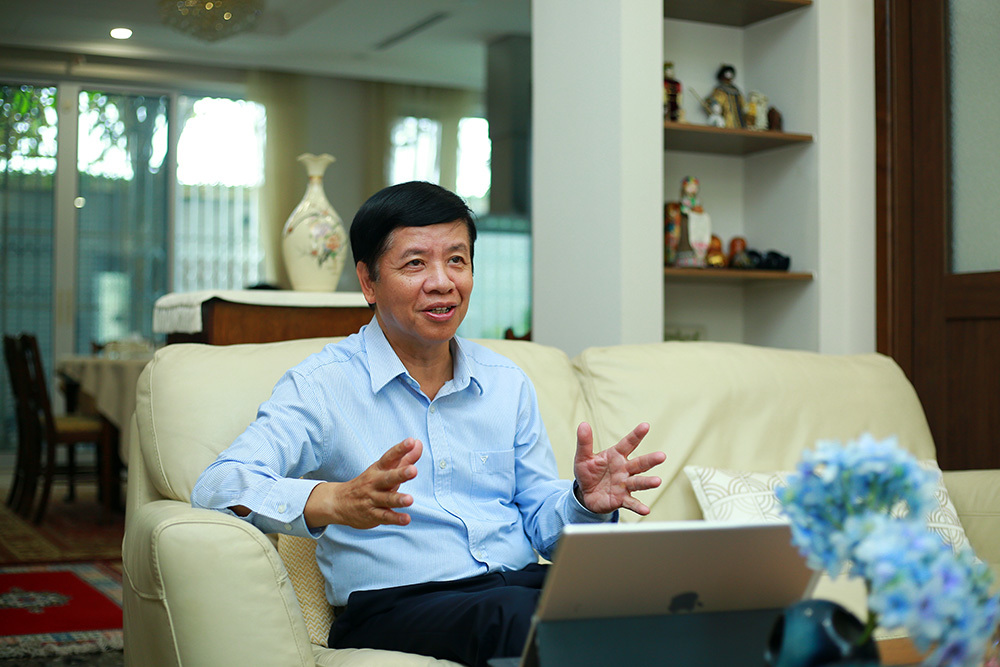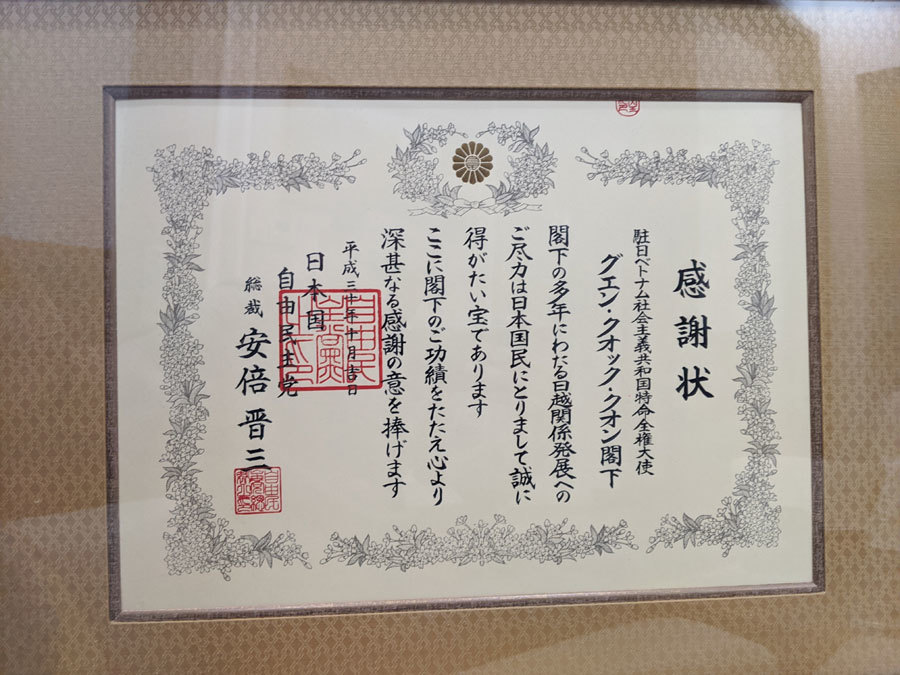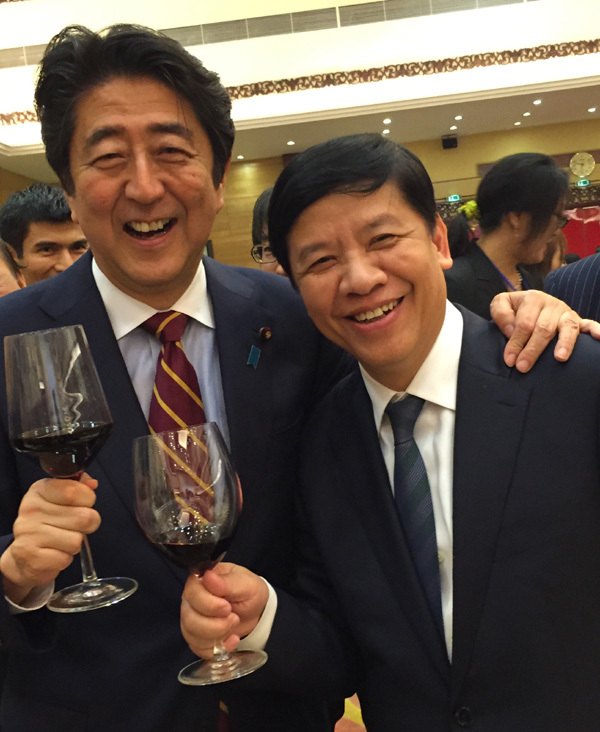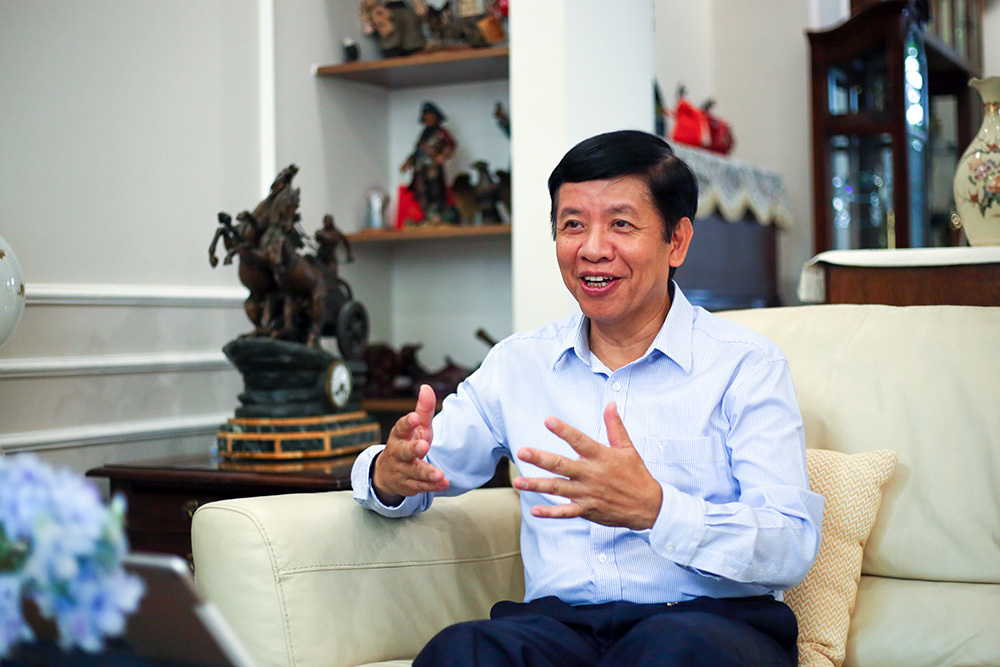VietNamNet talks with Former Deputy Minister of Foreign Affairs and Former Ambassador of Vietnam to Japan Nguyen Quoc Cuong about Vietnam-Japan relations and Japanese PM Abe Shinzo’s affection for Vietnam.
 |
| Former Deputy Minister of Foreign Affairs, and Former Ambassador of Vietnam to Japan Nguyen Quoc Cuong. Photo: Pham Hai |
Special affection for Vietnam
Prime Minister Abe Shinzo said that he personally attached great importance to Vietnam and had a special affection for Vietnamese leaders. How has Mr. Abe shown this?
The leaders of the two countries have affirmed that the Vietnam-Japan relationship is now at the best stage of development. Prime Minister Abe’s important contribution to this must be recognized personally.
Mr. Abe repeatedly told our leaders that he personally valued and had a special affection for Vietnam. I remember that in the first meeting with Prime Minister Nguyen Xuan Phuc, Mr. Abe told our PM that during his first term as Prime Minister (2006), he visited Vietnam and in 2007, when he was no longer the Prime Minister, he visited Vietnam again and was warmly welcomed by Vietnamese leaders. Every time Vietnamese leaders visited Japan, although they were very busy, they always met him. That was the reason why he chose Vietnam as the first country to visit (January 2013) after being re-elected as Prime Minister for the second time (December 2012).
I still remember that when the Communisty Party of Vietnam's General Secretary Nguyen Phu Trong paid an official visit to Japan, the Japanese Government and Mr. Abe personally gave a very respectful and cordial welcome, considering the Vietnamese Party Chief as a "national guest" even though the two countries have different political regimes.
Determination for cooperation
When PM Nguyen Xuan Phuc paid an official visit to Japan in 2017, Mr. Abe broke the precedent when joining his Vietnamese counterpart to attend and speak at the largest ever Vietnam’s investment promotion forum in Japan, which attracted more than 1,600 enterprises of the two countries. At that time, he affirmed to be hand in hand with his Vietnamese counterpart to promote relations and cooperation between the two countries and to support Japanese enterprises to strengthen cooperation with Vietnam.
Despite the Covid-19 pandemic, which has also raised many difficulties for Japan, this country still granted Vietnam tens of millions of USD through bilateral programs and international organizations. The Japanese government also decided to give aid worth nearly $1,000/person to over 400,000 Vietnamese people who are living, studying and working in this country, equal to the support level for Japanese citizens.
The Japanese Government also affirmed its willingness to continue providing assistance if Vietnam needs it. It is a very precious affection from the Government and people of Japan as well as Mr. Abe personally for Vietnam.
In response, the Vietnamese Prime Minister sent letters and inquiries to his Japanese counterpart three times. The Vietnamese Government, National Assembly, many ministries and localities, social organizations, businesses and Vietnamese people also supported Japan to cope with the epidemic by presenting millions of masks and medical protective clothes.
 |
| The letter from Prime Minister Abe to Vietnamese Ambassador Nguyen Quoc Cuong |
Letter to the Vietnamese Ambassador
During your term as Vietnamese Ambassador to Japan (2015-2018), what unforgettable memories do you have about Mr. Abe's special affection for Vietnam?
When the murder of Nhat Linh (a young Vietnamese girl in Japan) occurred, Mr. Abe directly met me and said that the Japanese Government apologized to the people of Vietnam. He assigned the Japanese Ministry of Foreign Affairs and the Japanese Ambassador to Vietnam at that time to go to Nhat Linh's hometown to burn incense and bow to her family.
I also remember at a reception of Prime Minister Nguyen Xuan Phuc, Mr. Abe toasted each guest, and he put his arm on my shoulder and toasted me very cordially like a friend.
When I was about to end my ambassadorial term, the Vietnam - Japan Friendship Parliamentary Union, with its leaders who were also key people in the governing coalition, organized a reception. Surprisingly, Mr. Nikai – the union’s president - brought a letter from Prime Minister Abe to me. The letter praised my contributions to the Vietnam-Japan relations during my term. To me, this is the most precious gift I brought back from Japan.
Three successes for Japan
In your opinion, during his record long term (2012-2020), what success did Prime Minister Abe bring to his country?
It is difficult to fully evaluate the success PM Abe has brought to Japan. Personally, I would like to note the three following main successes:
Firstly, in terms of internal politics, Prime Minister Abe has maintained political stability, ensured a solid government foundation. Before his term, there was a period of prolonged instability in Japan's internal politics, making it difficult to make and execute big decisions.
Mr. Abe has been in office since December 2012, or nearly eight years. He holds the record as the longest holding Prime Minister in Japanese history, which shows his very strong political bravery, which has created a certain stability in Japanese politics.
 |
|
Prime Minister Abe with Ambassador Nguyen Quoc Cuong
|
Secondly, the introduction and implementation of the Abenomics policy has had a positive impact on the economy. Since Mr. Abe became Prime Minister for the second time, the Japanese economy has experienced one of the longest periods of positive growth (GDP increased for 7 consecutive years from 2013 to 2019), although the growth rate was still low. Personal income, corporate revenue increased, consumption recovered, unemployment decreased, the economy initially got rid of decades of deflation, the stock market also recovered ...
Mr. Abe is also very attentive to enhancing the role of women in Japanese society through various programs.
Thirdly, regarding foreign affairs, Mr. Abe actively promoted active pacifism and global vision diplomacy, the "Free and Open Indo-Pacific" Strategy, economic linkage frameworks and international free trade, including the CPTPP; and strengthening Japanese-US alliance relations, improving relations with neighboring countries such as China, South Korea, and Southeast Asian countries including Vietnam, contributing to enhancing Japan's position and influence in the international arena.
Japanese PM who visits Vietnam the most
During Mr. Abe’s term, Vietnam - Japan relations developed brilliantly in all aspects. What is the highlight, in your opinion?
In both times as the Japanese Prime Minister, Mr. Abe made great contributions, leaving many important marks in bringing the bilateral relationship to a strong, substantive and effective development in all fields. In my opinion, there are at least 7 important markers:
Firstly, he is the Japanese Prime Minister who visited Vietnam the most (4 times). The first time was in November 2006, just 2 months after he took office and the second was in January 2013 - just a month after he returned to power and Vietnam was the first country he visited. Perhaps, excluding the US, Vietnam is one of the countries Mr. Abe visited the most.
 |
|
Prime Minister Nguyen Xuan Phuc and his Japanese counterpart in Hoi An ancient town in November 2017. Photo: VGP
|
Secondly, Mr. Abe attached great importance to upgrading the bilateral relations framework between the two countries. In November 2006, during his visit to Vietnam, the relationship between the two countries was upgraded to the relations "towards a strategic partnership for peace and prosperity in Asia". During his second term, the relationship between the two countries was upgraded to the " profound strategic partnership for peace and prosperity in Asia" during the state visit by President Truong Tan Sang (March 2014).
Thirdly, the political trust between leaders and people of the two countries has been constantly strengthened and enhanced, firstly through the exchange of a series of high-level visits.
On the Japanese side, we can mention the first historical visit to Vietnam by King Akihito and the Empress (March 2017).
Prime Minister Abe came to Vietnam four times. The President of the Japanese House of Representatives visited Vietnam in May 2017, and the President of the Senate visited Vietnam in December 2015.
On the Vietnamese side, Party General Secretary Nguyen Phu Trong paid an official visit to Japan in September 2015.
President Truong Tan Sang paid an official visit to Japan in 2014. President Tran Dai Quang visited Japan in 2018. Prime Minister Nguyen Tan Dung also visited Japan many times.
In the past four years, Prime Minister Nguyen Xuan Phuc has visited Japan five times. Chairman of the National Assembly Nguyen Thi Kim Ngan visited Japan in August 2015 as the Vice Chair of the National Assembly ...
 |
|
Former Deputy Foreign Minister Nguyen Quoc Cuong. Photo: Pham Hai
|
Vietnam's leading economic partner
Fourthly, it is about economic relations. For many years, Japan has always been our top important economic partner, the largest ODA provider to Vietnam, the 2nd largest foreign investor in Vietnam (with more than 4,500 projects, totaling $60 billion), the 3rd largest tourism partner and the 4th largest commercial partner. At the same time, it is the third largest export market for Vietnamese goods in the world.
Fifthly, the exchange between localities and people of the two countries has continuously increased over the past years. From 2017 to 2019, more than 20 governors of provinces in Japan visited our country. To date, there are more than 70 cooperation agreements between the two countries' localities.
Sixthly, human resource cooperation is a bright spot in the bilateral relationship. If there were only about 50,000 Vietnamese in Japan in 2012, after eight years, that number has increased by over eight times, to about 420,000 people, including 220,000 interns and 82,000 students.
This is an important resource for promoting cooperation between the two countries not only in the current period but also for decades to come.
Actively supporting Vietnam's Marine Strategy
Seventhly, Mr. Abe attached great importance to the role and position of Vietnam in the region and in the international arena. For the first time Japan invited our Prime Minister to attend the G7 Summit (May 2016) and the G20 Summit (June 2019). Japan actively supported Vietnam’s role as ASEAN Chairman 2020 and non-permanent member of the UN Security Council for the term 2020-2021.
Japan supports our position on regional issues, including the Eat Sea, upholds the respect for international law, the 1982 UN Convention on the Law of the Sea (UNCLOS), no threat and use of force, and peaceful settlement of disputes. This is also a country that actively supports Vietnam's Marine Strategy.
How do you see Vietnam - Japan relations at this time and prospects for bilateral relations?
We care about Mr. Abe's health, always want all the best for him, and he will be well soon.
As I mentioned above, the leaders of the two countries have affirmed that the relationship between the two countries is at the best stage of development.
As for the prospects, I can confirm with certainty that no matter who becomes the Japanese Prime Minister to replace Mr. Abe, the relationship between the two countries will maintain the current stable development momentum. Japan always attaches great importance to the role and position of Vietnam in the region as well as in the world.
When I was the Vietnamese Ambassador to Japan, I had the opportunity to meet with most of the top leaders in the current ruling coalition. They all have sympathy for our country and people. Many key leaders have visited and loved Vietnam.
In Japan, there are many parties with different stances on many domestic and foreign issues, but the special thing is that all of these parties support further development of the relationship between Vietnam and Japan.
Thai An

Japanese retailers rouse Vietnamese market, despite pandemic
While most enterprises have had to scale down their business during Covid-19 and give back their retail premises to landlords, Japanese retailers have continued to open more shops in Vietnam recently.

Vietnam’s position in the eyes of a Japanese scholar
Vietnam’s upper class, whose net worth is invested in more than $30 million, has increased to 13 percent in the past five years, surpassing 10,000 people.